jesus christ

MORE THAN FIVE decades ago, two young Brits with dreams of writing musicals came up with the audacious idea of a rock opera about the Passion of Jesus Christ, told from the point of view of Jesus’ betrayer, Judas Iscariot. From the very moment composer Andrew Lloyd Webber and songwriter Tim Rice proposed it, Jesus Christ Superstar provoked both adulation and condemnation. And five decades have done nothing to diminish either the show’s fire or the intensity of audience reactions.
In August, the Hollywood Bowl will host the musical with another innovative twist: Wicked’s Cynthia Erivo plays Jesus and rock star Adam Lambert takes on Judas, in a one-weekend-only production directed by Tony and Emmy Award winner Sergio Trujillo. Some have already condemned the production for giving a queer Black woman the role of Jesus, decrying it as “intentionally blasphemous” — a complaint that has been made about various aspects of the show (including its casting) from the beginning. But the show’s actual history reveals that Superstar has been anything but a blight upon Christianity. Generations of artists have found within it fertile ground to reflect on faith and justice, sacrifice and society.

A CENTURY AGO, the baseball-player-turned-evangelical-revivalist Billy Sunday preached a gospel supercharged by conspiracy theory and nationalism. He spoke against the backdrop of World War I to masses seized by national security anxiety directed at immigrant communities. Deploying a message made urgent and relevant by its conspiratorial frame, Sunday preached, “They call us the ‘melting pot.’ Then it’s up to us to skim off the slag that won’t melt into Americanism and throw it into hell or somewhere else.”
Hellish rhetoric has a long history in the United States for animating theological paranoia in service of supremacist political power. It’s also been part and parcel of American evangelicalism.
Like many kids growing up in evangelical culture in the 1990s, I was extremely familiar with hell. Popular preaching led with hell before it ever spoke of heaven. It described a place of terror reserved for the unbelieving, who always happened to be from the wrong political party or country. In those days, evangelical churches hosted so-called hell houses to “scare straight” teenagers who strayed from a very narrow moral code. My own church did annual dramas depicting people in hell. I prayed the “Sinner’s Prayer” more times than I could count, hoping I really meant it enough to save me for good. If you were to ask me then: “Do you believe in hell?” I would have said “Of course! I’m a Christian!” Belief in hell went hand in hand with belief in Jesus.
My faith today requires me to dismantle the understanding of hell I received as a child and the cultural use of hell popular today in the rise of Christian nationalism. Hell, in the Trump era, is a rogue theological element, unmoored from the Christian story. When Donald Trump says, “I want to make the country great again. This country is a hellhole,” he casts himself, theologically, in the role of Christ, dispensing judgment on who is good and who is bad.
Trump wields diabolical power to throw people to political hells — and that’s what he’s doing. This isn’t new. Poet Langston Hughes wrote prophetically in 1936, “Fascism is a new name for that kind of terror the Negro has always faced in America.”
In this stream of prophetic thought, we are roused to consider our own responsibility today. We cannot look away from the political hells rising up around us, including indiscriminate ICE raids at churches; repurposing the Guantanamo Bay detention camp to hold migrants; freezing funding for critical family services and health programs in the U.S. and around the world; dispossessing hundreds of thousands of civil servants from their livelihood; and blocking asylum access for those in fear for their lives — all creating indescribable suffering for those who don’t fit a very narrow white supremacist or libertarian agenda.

A LOT OF BEGGING happens at Christmas. There are pleas in the toy aisle and hints left open on laptops. But no one begs to be in labor. Not even a woman who is pregnant. Unless, of course, she is at the bitter end of her pregnancy.
In the language of King James, Luke tells us that Mary is not just pregnant, but she is “great with child” (Luke 2:5). She is on the cusp of birthing, of being the first one to slide her hands up under the armpits of the warm, slippery flesh of God. No one before or after will have God in quite this way.
In Mary, the Word became flesh and was born in the most mundane, most primal human act. This flesh must count for something. The extremely pregnant body of Mary — great with child — reveals the nature of our waiting for Christ and what it might mean to cry out for Jesus’ coming.

I AM ABOUT to begin my Jesus Year. Which is to say, I’m one month away from turning 33, the age that many scholars believe Jesus was when he expelled demons, performed miracles, overturned tables and norms, and lived so counter to the expectations of empire that he was crucified for it, therein saving humanity with a radical act of peace and love.
Now, I don’t plan on doing all that. It’s already been done! But I love that Christians have transformed a random age into something significant. Most of the monumental birthdays of youth are behind me: I can already drive (16), I can vote (18), I can drink (21), I can rent a car without paying a surcharge (25), and I can get injured anytime I go for a jog without stretching (32). But 33 is even more special. While I don’t plan on dying, resurrecting, restoring, and ascending, I do have a few goals for my Jesus Year.

Fuller Theological Seminary has joined a growing list of schools where administrators are being pressed by students, alumni, and faculty for designation as a sanctuary campus.
In the aftermath of Donald Trump’s election as president, some campuses are considering the moniker “sanctuary campus,” which generally means that the university will not willingly give the government information about their students, staff, or faculty who are undocumented immigrants.

The early Christians had to deal with the loss of their most important mandala — the one they called their Lord and Savior, Jesus Christ. Isn’t Christianity weird? I mean, Christians revere Jesus the Messiah, the King. That’s weird because the one Christians revere as the incarnate word of God was killed. He became a victim of human violence.
How do you atone for that? How do you reconcile with the fact that the one whom Christians worship became a victim of human violence?

The high liturgical seasons of Advent and Lent have always held a special place in my heart because of their emphasis on the life, death, and resurrection of Christ. But Advent has special significance because it, unlike any other season, most accurately expresses the now-not-yet feeling of the Kingdom of God. It highlights the fact that we are waiting. We’re waiting for the return of God, for the day when God will come and restore all things.
Many of our Advent hymns capture this beautifully, especially “O Come, O Come Emmanuel.” Before the birth of Christ, God’s people lived in a time of waiting. The space between the Old and New Testaments, between Malachi and Matthew, cover a span of more than 400 years. That was 400 years without a word from God, without a prophet. It was 400 years of one invasion after another as one conqueror overtook another. And the people began to wonder, “When will YHWH come? When will God send the Promised One?”
And then, announced by shepherds and angels, and greeted by Magi from the East, Jesus was born in Bethlehem. The Promised One had come! The Kingdom of God was at hand! But not quite. He lived, he died, he rose again … but we’re still waiting. We live between the two great Christ events of history, between his first coming and his second. We live in the in-between time as we await the return of the King and the day when God will come again to dwell with God’s people, to wipe away every tear, and to finally and for all eternity make everything new (Rev. 21).

The Cross is an inexhaustible mystery, but among the many things it does so well is make visible the love of God.
In Jesus Christ, God is not an abstraction, concept, or idea. The Unknowable is made known. The Invisible is made material. All mysticism is now grounded, and all agnosticism now countered, in this particular Person; there is now, paradoxically, a Measure within Measurelessness.
"For in Christ lives all the fullness of God in a human body." (Col. 2:9) "For God in all his fullness was pleased to live in Christ." (Col. 1:19)
Conversely, whatever is not revealed in Jesus is not the Triune God.
Contemporary Christians (of all sorts of persuasions) tend to de-couple God from Jesus.
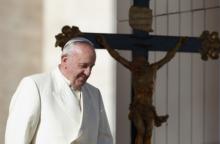
It’s one thing to say kind words about gay people and atheists while admonishing those who would bury them in stones.
It’s one thing to walk humbly and call the Catholic Church to compassion for the poor.
It’s one thing to kiss a horribly disfigured man from whom most people would run in disgust.
But apparently, it’s quite another to start calling out growing economic inequality and naive faith in capitalism. By doing just that in his recent encyclical, Pope Francis has touched a third rail in conservative American politics. So begins the backlash.
Yet in the new round of skirmishing around Francis and his supposedly “liberal” views, U.S. political pundits and news media wags — both progressive and conservative — are missing the point about the pope and what he’s up to. Their mistake? They see his words and deeds through the lens of American politics and ideology. What Francis is doing is prophetic, not political, and we should recognize that he’s playing, to his credit, in a whole different arena.
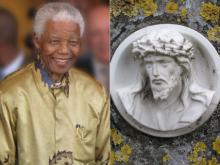
Few would deny Nelson Mandela’s greatness, but one of Britain’s best-known journalists, Dominic Lawson, has taken the media to task for comparing South Africa’s first black president to Jesus.
Writing on the eve of the departure of world leaders to Johannesburg to attend a memorial service for Mandela, who died last week, Lawson wrote in the Daily Mail: “He was a giant — but how absurd for the BBC to compare Mandela to Christ.”
Lawson singled out BBC presenter Evan Davis who told listeners on a Dec. 7 radio program that Mandela should be ranked alongside Jesus in “the pantheon of virtue.”
The BBC radio program included former U.S. President Jimmy Carter, who emphatically dismissed the notion of Mandela being on par with the founder of Christianity.

Jim Wallis talks about the #FaithfulFilibuster outside the Capitol Building and offers a reading of his conversion text, Matthew 25.

The bearer of Good News, the one who carries the message of Resurrection, is not motivated by fear of punishment (either for herself or others) but by confidence in her experience of the love of God. She knows God's love is greater than anything in herself or in her hearers; that Jesus can conquer anything in them that is not controlled by holy love.
"Such love has no fear, because perfect love expels all fear. If we are afraid, it is for fear of punishment, and this shows that we have not fully experienced his perfect love." 1 John 4:18
God's love has the final word, for Jesus has conquered the sin of the whole world and has defeated the grave. Christ's best messengers know this love by its all-consuming redemptive activity in themselves and confidently carry this love to others, without fear.

NASHVILLE, Tenn. — For the third time, Jesus is about to change Reza Aslan’s life.
As a teenager, Aslan turned to Jesus in an evangelical youth group, where becoming a Christian made him feel like a real American.
He later studied Jesus of Nazareth in college, which led Aslan to a doctorate in the sociology of religion.
Now Aslan’s controversial new book about Jesus is about to make him a best-selling author. Zealot: The Life and Times of Jesus of Nazareth has already reached No. 1 on Amazon.com. It’s expected to debut this weekend on The New York Times’ best-seller list, becoming the latest in a long line of controversial and profitable books about the so-called historical Jesus.
Aslan said he wants to show the power of Jesus as a flesh-and-blood human being, rather than the savior of the world. That Jesus has gotten lost in 2,000 years of church history, he said.
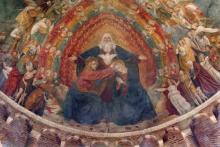
"God doesn't just hate what you do. God hates who you are." — A Well-Known Contemporary Preacher
What this pastor says above, as well as much of what he says in the sermon from which this line is taken, comes from reading the Bible as if every sentence in it can and should be read as bearing the same weight as all others when we answer the question: "Who is God?"
When we read the Bible with the first Christians we begin to understand that the way they read these texts is not the way an uber-rationalist modern reads them.
Since Jesus himself was the one who taught the apostles to read the Old Testament, the way the churches they founded read the Bible is important for us, too.
God never was only the words he utters, or the ones we utter about God — just like we are never the sum total of everything we have spoken or what has been spoken of us. There is so much more to the mystery of any person than mere words; how much more so the mystery of the divine persons.

A new translation of the Bible called “The Voice” (no, Cee-Lo makes no appearances in this one), published by Thomas Nelson, has created quite a buzz. The discussion is not so much around what is in the newest version, but rather what’s left out.
According to a recent article on the Huffington Post, the words “Jesus Christ” do not appear anywhere in the New Testament. And for some, this is tantamount to heresy. The publishers point out, however, that “Christ” was not, in fact, Jesus’ last name.

“We know love by this, that he laid down his life for us--and we ought to lay down our lives for one another. How does God's love abide in anyone who has the world's goods and sees a brother or sister in need and yet refuses help? Little children, let us love, not in word or speech, but in truth and action.”
On April 29th, many churches will be hearing this reading from I John 3:16-24 as the Epistle Lesson for the Revised Common Lectionary for the Fourth Sunday of Easter/Year B. Here is a new hymn inspired by this biblical teaching for compassion.

When I was in my early 20’s, a Bible teacher by the name of Dianne Kannady posed a rhetorical question that continues to haunt me to this day: “If Jesus was your only source of information about what Christianity should look like, how would you live your life?”
That question has gotten me into a lot of trouble over the years.
Consider the three things that instantly come to mind.
1. Jesus preached nonviolence.
2. Jesus was a faith healer.
3. Jesus challenged the religious fundamentalists of his day.
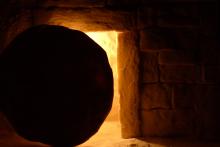
The Gospel of St. Matthew, Chapter 28 tells us:
The angel spoke to the women: "There is nothing to fear here. I know you're looking for Jesus, the One they nailed to the cross. He is not here. He was raised, just as he said. Come and look at the place where he was placed.
"Now, get on your way quickly and tell his disciples, 'He is risen from the dead. He is going on ahead of you to Galilee. You will see him there.' That's the message."
To listen to a playlist of music for this Resurrection Day 2012, CLICK HERE.
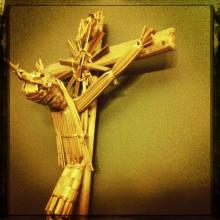
Good Friday. Is this something we can understand? What makes it so "good?"
Sure, we have theologies about this moment in history. We have systematic notions about why who and what. We tell the story every year. Some traditions reenact the tale more than once a year. If you attend a church from one of the "liturgical" traditions, you here the story told during the Eucharist every Sunday. "Christ has died. Christ has risen. Christ will come again." It's the Paschal Mystery told again and again. I also know some baptist preachers who tell the story of the Passion of Christ every Sunday. It is the Gospel, after all. This story, the Passion, is The Gospel for many of us Christian preachers. And to not share the Passion is to not share The Gospel. If their sermons don't end with the proclamation of the sarcifice of Jesus, well, then it just isn't Church.
I'm still sharing that e-unspoken part of my faith again. This is not new. Nor is it unintegrated with the rest of my Christian spirituality. It's actually essential to it. So, in the spirit of clarity, I'm sharing this stuff with you.
I have no idea what Jesus meant by giving himself over like this. We read the scripture last night at the Maundy Thursday service at First Baptist. "Not my will but your's." Lord, have mercy. Someone asked the question as someone does every year, "Why would God want Jesus to die? If it's God's will...Why would God will this to happen?" I have some practiced answers. This year I offered them as I usually do.
"First, let me tell you what the tradition says..." I give a theological gloss and watch their eyes glaze over. Right. Of course. This isn't an answer any more than a stump speech is an indication of what will actually happen if one of these people in the news are elected to public office. So, I move on.

Dear HFASS,
How are you? I am fine.
Actually that’s not true.
See, I wrote another sermon this week. A real one. I worked on it all week. And then yesterday afternoon I threw it away and just wrote you this letter instead. Because I realized that in my sermon I was trying really hard to convince you of something.